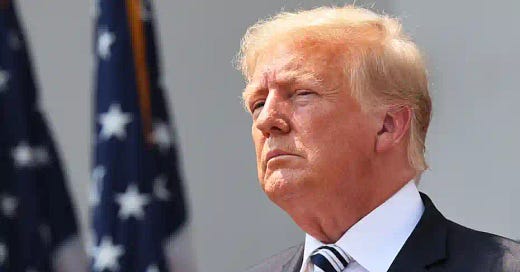Corruptly. That is the state of mind, or specific intent, that the law governing obstruction of an official proceeding requires for a defendant’s conviction. It’s also the word on which the January 6 Committee is so focused, even though they haven’t come out lately to say it directly. They know that it won’t be enough for prosecutors to show that Donald Trump attempted to impede the electoral count through various means. We already know he did, and that’s not really in dispute. Rather, prosecutors must show that he did so “corruptly.”
But what exactly does “corruptly” mean here? The Supreme Court has never weighed in on this directly, so we’re left looking at what lower courts have said about it. (Here, I’m borrowing from the analysis of legal scholar Eric J. Tamashasky, with an attempt to strip out much of the denser legalese.)
“Corruptly” could mean an “improper motive or bad or evil purpose” as many courts have ruled. After all, people can seek to impede Congress in all manner of ways, some legal and some illegal. Protesting lawfully to persuade Congressmembers to object to the electoral tallies of the states, for example, is protected under the First Amendment. The rally at the Ellipse on January 6 broke no laws, at least until Trump incited the crowd to march down the Capitol in violation of their permit. But even then, had the crowds remained outside the Capitol perimeter, no prosecutor would have charged them with obstruction of Congress, no matter how loud their voices grew, and even though they were technically there illegally. Indeed, courts will be careful to construe words like “corruptly” so as not to impinge on constitutionally protected rights like freedom of speech and freedom of assembly.
But a definition that establishes an “improper motive” or “bad or evil purpose” as its requirement possibly gets us into tricky territory in this case. As we saw in the videos at the end of Tuesday’s Committee hearing, many of the rioters subjectively and genuinely believed that they were acting not for an improper, bad or evil purpose but rather to save the Republic. It’s why nearly half of Republicans polled still believe to this day that the rioters were actually “patriots” on January 6.
Trump’s lawyers could build on this. It’s not illegal, they might argue, to tell your friends to, say, smash the window of a hot car to save a child trapped inside, even if you were mistaken because the car was running and it had the air conditioning on. You simply didn’t act with an improper motive or with a bad or evil purpose. Such a broad definition of “corruptly” might also open the door to the use of the Big Lie by Trump and his allies to justify all their insider schemes and plots to hold onto power. Trump’s lawyer John Eastman has already argued in one court case that he acted in good faith based on the information he had been told about electoral fraud, which he claims he believed.
The Fifth Circuit looked closely at this very question of what “corruptly” means, at least in the context of trying to influence an IRS investigation. In United States v. Reeves, the court held that “corruptly” means acting with “an intent to secure an unlawful advantage or benefit.” This holding and its reasoning resonate because it gets to the heart of what corruption really is: a use of your power or position to get something for you and your cronies that you’re not entitled to under law. The court noted that “corruptly” must mean something other than merely acting with an improper motive or bad or evil purpose. After all, acting to obstruct or impede the IRS (or Congress for our purposes) is already presumptively “improper” and “bad,” so “corruptly” must mean something else, or else the word “corruptly” becomes redundant. And that’s a big no-no for courts examining the meaning of statutes.
Under a definition of “corruptly” that means “an intent to secure an unlawful advantage or benefit,” different parts of the story fall into place. As the Committee is showing, piece by puzzle piece, Trump and his allies intended to use their power and position to secure an unlawful advantage or benefit, namely the overturning or the delaying of the electoral count so they could hold onto power. In this light, the Big Lie becomes their cover, and not their motive.
Returning to the kid-in-the car analogy, if it turns out what the defendant really wanted was to steal a purse he had spotted inside the car, then a jury could find that it was illegal for the defendant to tell others to break the window to save the kid just so he could steal the purse. This is especially true if people had repeatedly pointed out to the defendant that the car was in fact running, the A/C was on, and the kid was never in any danger.
“Saving the kid” sure starts to look like a pretense for stealing the purse.





And oh...of course that Nigerian yellow cake WAS weapons-grade and there WERE weapons of mass destruction, and those WERE centrifuge tubes for refining uranium, and there were rolling bio-weapons laboratories. We set a dangerous precedent by not prosecuting THOSE lies that cost Iraq over 200K casualties, 7K American soldiers and displaced several million people. I'm not optimistic.
I love this: “Saving the kid” sure starts to look like a pretense for stealing the purse. “Stop the Steal” sure starts to look like a pretense for a coup…